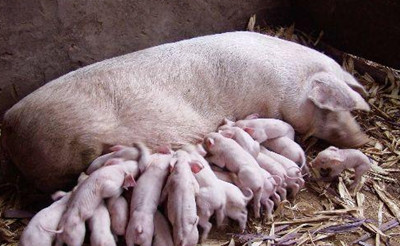(单词翻译:单击)
听力文本
This is Scientific American — 60-Second Science. I'm Jason Goldman.
Human parents usually have one or sometimes two offspring at a time, and when babies get delivered we pour all our energy into child rearing. But other animals raise lots of babies at once. And the weaker individuals can be at a big disadvantage. If there's not enough food, for example, a mother bird might offer more to those chicks who are more likely to survive. Nature's a rough place.
But mammals like pigs can't selectively provision their offspring the way birds do, because all the babies nurse at the same time. And yet the strongest piglets still seem to have an edge. One hypothesis goes that the weaklings might not have sufficient energy to stimulate the mammary gland while they suckle, so they eventually starve from a lack of nutrition.
But it turns out that vigorous stimulation of one mammary gland can increase blood flow in neighboring glands. So if a weakling was canny enough to position himself next to one of his strongest siblings, he might get more milk than positioned elsewhere.
"I got this idea during observations of piglets, of course, because I had a feeling that weaklings are doing better in the company of the strongest siblings."
Biologist Janko Skok from Slovenia's University of Maribor.

To see if his hunch was right, Skok observed 18 litters, including 150 piglets. Twenty-three of them were classified as weaklings, which meant they weighed less than one kilogram at birth or they died before weaning. Then he looked to see what differentiated the weaklings that survived from those that died.
And indeed, those weaklings that survived were more likely to nurse next to their strongest brothers and sisters. "Weaklings, which are limited in terms of mammary gland stimulation, actually take advantage of strong stimulation implemented by their heavier siblings, who in turn do not suffer any costs from this activity."
The research were published in the journal Behavioural Processes.
Skok says that pig breeders commonly sort piglets into different weight classes, so the heaviest babies nurse together with one mother while a different mother raises the weaker babies. But his results might mean that more piglets could survive if breeders instead mixed piglets of different sizes, so that the smaller ones could take advantage of their larger counterparts.
What this finding does not explain is why my younger brother, who as a kid always and failed to steal my dessert, is now stronger than I am.
Thanks for listening for Scientific American — 60-Second Science Science. I'm Jason Goldman.
参考译文
这里是科学美国人——60秒科学。我是杰森·古德曼。
人类父母通常一次可以生下一个或两个后代,孩子出生后,我们会将所有精力投入到养育孩子上。但是其他动物会同时养育很多孩子,而弱一点的孩子则可能处于生长劣势中。比如,如果没有足够的食物,一只母鸟可能会给那些生存机率更大的小鸟提供更多食物。大自然是生活艰难的地方。
但是,像猪这样的哺乳动物不能像鸟那样有选择地给后代提供食物,因为所有的猪崽是同时养育的。但是,最强壮的小猪似乎仍然有优势。一种假设认为,弱猪崽在吸奶时可能没有足够的能量去刺激乳腺,所以它们最终会因为缺乏营养而饿死。
但事实证明,强烈刺激乳腺会增加周围腺体的血流量。所以如果弱崽足够精明,可以找到位于最强壮兄弟姐妹旁边的位置,它可能会得到更多的奶。
“我在观察小猪时产生了这个想法,因为我有一种感觉,弱崽与最强壮猪崽结伴时会更好。”
詹科·斯科克是斯洛文尼亚马里博尔大学的生物学家。
为了验证自己的直觉是否正确,斯科克观察了18窝仔猪,共150头小猪。其中有23头被归类为弱崽,这意味着它们出生时的重量小于一公斤或它们会在断奶前死亡。随后他鉴别了那些存活下来的弱崽与夭折弱崽之间的不同之处。
事实上,那些存活下来的弱崽更可能使旁边最强壮的兄弟姐妹得到哺育。“弱崽刺激乳腺分泌的能力有限,但它们可以占到强壮猪崽刺激乳腺分泌乳汁的便宜,而这些强壮猪崽也并没有什么损失。”
该研究结果发表在《行为过程》期刊上。
斯科克说,养猪人一般会将仔猪分成不同的重量级别,最重的猪崽由一只母猪喂养,较弱的猪崽由另一只母猪喂养。但他的研究结果可能意味着,如果饲养者将不同重量的仔猪混合喂养,那可能会有更多的小猪存活下来,这样较小的仔猪就可以利用大猪崽而存活下来。
这一发现没能解释的是,为什么小时候总是偷不到我的甜点的小弟弟,现在却比我更强壮。
谢谢大家收听科学美国人——60秒科学。我是杰森·古德曼。
译文为可可英语翻译,未经授权请勿转载!
重点讲解
重点讲解:
1. at once 同时;一起;
例句:The teacher asked the pupils not to speak at once.
老师叫学生们不要同时说话。
2. differentiate from 使有差别;使不同;
例句:I can't differentiate one variety from another.
我无法将这几个品种区别开来。
3. take advantage of 利用;占……的便宜;
例句:It never occurred to me to take advantage of him.
我决没有想到过要占他的便宜。
4. in turn 继而;转而;反过来;
例句:That, in turn, would be useful in reconfigurable circuits.
反过来,通过改变电路也一样有作用。


